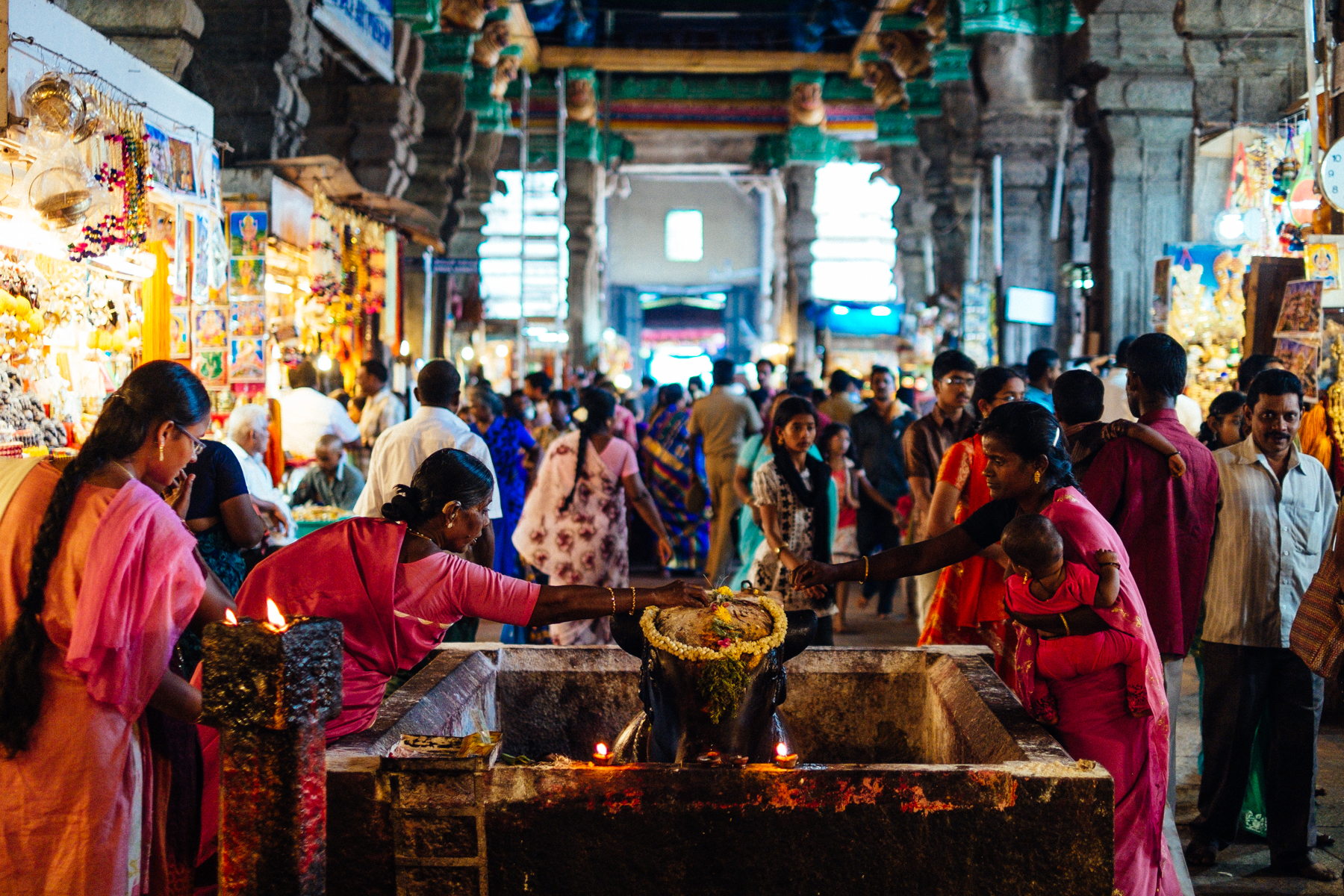
What’s in a Hindu name? Like most things Hindu, the answer varies based on who’s giving the answer but follows a couple of similar patterns. Most Hindu personal names have meaning. They may be the names of Gods or Goddesses, of virtues, or pay homage to people, places, or things that carry aspirational or spiritual significance.
Hindu naming conventions differ based on what part of India a person is from, and further differs for Hindus living in different parts of the world.
In India, and South Asia more broadly, Hindu names follow three main traditional patterns… but there are exceptions
In Northern India it’s generally ‘personal name + middle name (if using one) + surname (which is the person’s father’s surname in the case of men and unmarried women, or the husband’s surname for married women)’.
In Western India it’s ‘personal name + father’s personal name + family name’.
For example, Mahatma Gandhi’s full name was Mohandas (personal) Karamchand (father’s name) Gandhi (family name).
Both of these roughly follow patterns with which Western readers are accustomed. In Southern India things become less familiar, though simple to understand once someone points it out to you.
Southern India names, from the Tamil, Malayali, and Kannada speaking communities generally work like this: ‘place of origin + father’s personal name + personal name + jati name’.
For example, the famous yoga teacher BKS Iyengar’s full name was Bellur (place of origin) + Krishnamachar (father’s name) + Sundararaja (personal name) + Iyengar (jati,community).
In the Telegu speaking community there is still another pattern: ‘family name + personal name + jati name’.
Historically, the Himalayan Academy points out, in Vedic times there was a Sanskṛit convention for indicating male names: “If Garga was the father, then Gargi was the son, Gargya the grandson and Gargyāyana the great-grandson.”
Hindus names in Bali also have specific meaning
In the 21st century Balinese Hinduism is distinct in practice from Hinduism elsewhere in the world, but there are many similarities nevertheless, including when it comes to names.
Whether male or female, the first name generally indicates birth order: Wayan, Putu, or Gede for the firstborn child; Made or Kadek for the second; Nyoman or Komang for third; and Ketut for fourth. The cycle repeats if a family has more children than that. Such a practice has existed in many ancient communities of the world.
Varna (ancestral family occupation) also figures into Balinese names. If a person has Ngurah, Anak Agung, or Tjokorda in their name, that indicates their family were of the kshatriya varna (rulers, soldiers, etc). People whose ancestors were priests (brahmin varna) have Ida Bagus or Ida Ayu (for men and women, respectively) in their name.
Balinese Hindus also often have a personal name with a positive meaning, such as Setiawan (faithful) or Dewi (goddess).
With non-Indian and non-Balinese Hindus, naming conventions can follow Indian naming patterns, or not.
For people coming to Hinduism from non-Indian and non-Balinese society, there is no consensus on naming children traditional Hindu-sounding names or changing names to indicate religious affiliation.
Official members of the Saiva Siddhanta Church, which has roots in Tamil Saivism and is based on the Hawaiian island of Kauai, requires people entering that lineage who have Western or non-Shaivite names to:
“Adopt a Shaivite name, first and last, and have it made legal … The change of name, and using it under all circumstances, and this means all circumstances, is an important sign of religious sincerity to the Hindu community. It shows the willingness of the newcomer to stand up and be counted as a Hindu. So significant is the change of name to the Hindu community that an adoptive with a Hindu name on his passport can gain entry to many temples which categorically deny entrance to Westerners on the grounds that they are assumed to be non-Hindus. Proceed with confidence. Be a hundred-percenter. Don’t sit on the fence. It is risky to walk down the middle of the road. Stand up boldly and declare who you are.”
In the ISKCON tradition, which likely has more non-Indian followers than any other Hindu group, is more lax in this regard. While some ISKCON devotees do use names rooted in Sanskrit, or at least one name rooted in the Hindu tradition, others retain their birth name, others still use a “spiritual name” within the ISKCON community while retaining their birth name outside of it.
What about ‘Das’?
The name ‘das’ is not uncommonly added onto other Hindu names in a variety of Hindu lineages, either as a standalone word or as a sort of suffix. It literally means ‘slave’ but in practice has the positive connotation of ‘servant of’ or ‘devotee of’. Hence you will find people named Shivadas, Kalidas, Haridas or, people using Das as essentially a surname, such as the Grammy Award-winning kirtan wallah Krishna Das — implying a person who has dedicated their life to Lord Krishna.
What about the name ‘Singh’?
The word ‘singh’ means ‘lion’ and is derived from the Sanskrit word simha. As a last name it is the 6th most common surname in the world. Though perhaps commonly associated with Sikh men, it is actually more frequently used as a surname by many Hindus whose families originated in the northern parts of India.
Does astrology play a part?
Yes, astrology often plays a part in Hindu names. Based on horoscope and time of birth, certain first sounds to names are considered most appropriate, and the family will then choose a name based off that advice.








































